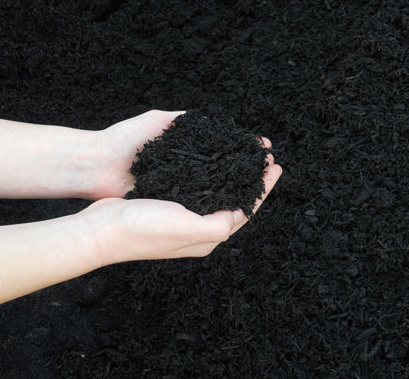Mulching is one of the most beneficial practices you can do for your garden, and it’s especially important in the Pacific Northwest. Mulching helps retain moisture in the soil, suppress weeds, regulate soil temperature, and promote healthy plant growth. But with so many types of mulch available, how do you choose the right one for your garden? At Seattle Sustainable Landscapes, we recommend using dark fine mulch for its many benefits in planted areas.
Dark fine mulch is made from finely ground bark, and it’s our favorite type of mulch in the Pacific Northwest. Here are some of the benefits of using dark fine mulch:
- Moisture retention: Dark fine mulch helps retain moisture in the soil, which is especially important during our long, dry summers. This helps reduce the need for watering, which not only saves water but also saves you time and money.
- Weed suppression: Mulch helps suppress weeds by blocking sunlight, which prevents weed seeds from germinating. This means less time spent weeding and more time enjoying your garden.
- Soil temperature regulation: Mulch helps regulate soil temperature by insulating the soil from extreme temperatures. This is especially important in the Pacific Northwest, where our winters can be cold and wet, and our summers can be hot and dry.
- Nutrient-rich: As dark fine mulch breaks down over time, it adds nutrients to the soil, which helps promote healthy plant growth. This means your plants will be healthier and more resilient. Many dark fine mulches have compost as a key ingredient.
- Aesthetically pleasing: Dark fine mulch has a dark, rich color that looks great in any garden. It provides a clean, finished look to your garden beds, and it complements a wide range of plants and landscaping styles.
At Seattle Sustainable Landscapes, we’re committed to using sustainable practices that benefit both our clients and the environment. That’s why we recommend using dark fine mulch in your garden. Not only does it provide many benefits to your plants, but it’s also a sustainable choice that helps reduce waste and conserve resources.
So if you’re looking to improve the health and beauty of your garden, consider using dark fine mulch. It’s a simple and effective way to promote healthy plant growth and make your garden more sustainable.
Now that we’ve established many of the benefits of mulching. When is the ideal time of year to mulch your planted areas? While mulching can be done any time of year, there are certain times that are better than others. The best time to mulch is in the spring, after the soil has warmed up and any winter mulch has been removed. This helps retain moisture during the hot, dry summer months.
However, if you haven’t mulched yet this recently, don’t worry! It’s never too late to start mulching. In fact, adding mulch later in the season can help protect your plants from extreme temperatures and retain moisture during dry spells. And if you missed the spring mulching window, fall is another great time to add mulch. Fall mulching helps insulate the soil and protect your plants from winter cold and wind.
Regardless of when you choose to mulch, it’s always better to mulch than not to mulch. Mulching is a simple and effective way to promote healthy plant growth and reduce the need for watering and weeding. It’s also a sustainable choice that helps conserve resources and reduce waste.
At Seattle Sustainable Landscapes, we encourage our clients to mulch their gardens year-round. Our mulching services help retain moisture, suppress weeds, regulate soil temperature, and promote healthy plant growth. We use only high-quality, sustainable mulch to ensure the health and beauty of your garden.
While we use many mulch suppliers throughout the Seattle area, our favorite is Cedar Grove and their Pro-Mulch product
So whether you’re mulching in the spring, summer, fall, or winter, or you’re just starting to mulch for the first time, know that you’re making a positive impact on your garden and the environment. Contact Seattle Sustainable Landscapes today to learn more about our mulching services and how we can help you create a beautiful, sustainable garden.

